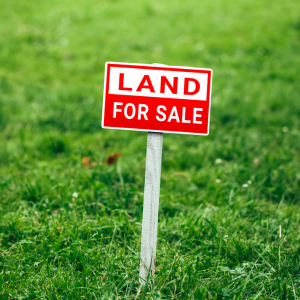
Selling Land with Liens in Florida: A Stress-Free Guide
Does your Florida land come with some extra baggage? Liens that are blocking your exit strategy? Whatever landed you here, you’re wondering if anyone will buy your problem property.
People buy land with liens all the time in Florida. Liens complicate things, but they don’t doom your property forever. You just need to be patient and proactive.
This guide will show you how to sell land with liens in Florida. We’ll also help you find buyers who see opportunity on your land with an attached lien instead of obstacles.
What Are Property Liens?
A lien is someone’s official “dibs” on your property until you pay them back. Yep, you read it right. They call first dibs. Although they can’t move onto your land or claim ownership, they hold legal cards that can mess with your selling plans.
Once filed against your Florida property, liens become public record. Buyers, lenders, and title companies will find them during research, so hiding isn’t an option.
Liens come in two types. Voluntary liens are ones you agreed to, like mortgages, where you pledged your property as collateral. Meanwhile, involuntary liens are imposed when you fall behind on payments or lose legal battles.
Lien holders get legal powers over your property that vary by debt type and Florida law. They can’t kick you off tomorrow, but might force a sale if necessary. Fast Land Offers can help you do it legally and without losing your mind.
Can You Sell Land with a Lien in Florida?
Yes, and it happens daily across Florida. The state won’t stop you from selling just because liens exist. You have full legal rights to market your property, including complications.
Note, though, that Florida requires honesty about liens with buyers. You must disclose them through official forms and direct conversations. If you hide liens, you’ll face fraud charges and lawsuits that make your problems look tiny.
The challenge here is finding buyers who won’t run when liens surface. Most traditional buyers want clean deals and will disappear fast when complications arise.
Conventional lenders also refuse to finance properties with active liens, which can exclude many potential buyers. But don’t panic. Plenty of buyers hunt specifically for these situations. We’ll share some of them here later.
Common Types of Liens on Florida Property
Here are the types of liens that can affect your home sale directly.
Tax Liens
Property tax liens hit when you don’t pay county taxes. The government slaps these on your land, and they jump ahead of almost everyone else in line. They grow with interest and penalties that can turn small bills into huge debts.
Mortgage Liens
These come standard with property loans. If you borrow money using your land as collateral, your lender keeps a mortgage lien until you pay every penny back.
Contractor’s Liens
This is also called mechanics’ liens and usually surprises property owners who thought they had simple business deals. Florida lets workers and suppliers file liens for unpaid work, even for small amounts.
Judgment Liens
If you win a court case, you can convert that victory into a property lien. These come from credit disputes, business fights, injury cases, or contract battles.
HOA Liens
Homeowners’ associations also don’t mess around with unpaid dues. They can file liens and even move to foreclosure when bills pile up.
Government Tax Liens
The IRS or the state of Florida can levy your property for unpaid income taxes. Government agencies have special collection powers that make these extra tough.
Strategies for Selling Land That Has Liens in Florida

There are three main approaches to selling land with liens in Florida. Your priorities should drive which approach you choose.
Paying Off Liens Before Listing
This is the cleanest approach if you’ve got the cash to make it happen. You clear all liens before listing the property, then sell it like any other piece of land.
This strategy means you get the interest of a vast pool of potential buyers. It also lets you get top dollar.
The math needs to work in your favor, though. Total all your liens, then compare that to your land’s market value minus selling costs. This approach makes sense if you’ll still walk away with decent money after clearing everything.
Using Sale Proceeds to Clear Liens at Closing
This is probably the most common approach for selling land with liens. You find a buyer, negotiate a sale price, then use the money from closing to pay off all liens before transferring the title.
Your closing agent or attorney handles the lien payoffs as part of the transaction. They’ll contact each lien holder, get payoff amounts, and cut checks on closing day.
What about you? You get whatever’s left after liens, closing costs, and commissions. This strategy works when your land is worth more than your total liens plus selling expenses.
Negotiating Lien Releases with Creditors
You may also convince lien holders to accept less than the full amount owed. This is usually possible for older liens or situations where creditors doubt they’ll ever collect the full debt.
Your first move is to call each lien holder and explain your situation. Tell them you’re selling the property and ask if they’d consider a reduced payoff. Many creditors will negotiate rather than risk getting nothing if you leave the property entirely.
Lien holders have legal powers over your property that vary by debt type and Florida law. They can’t kick you off tomorrow, but might force a sale if needed. Any settlement must be in writing before payment; verbal promises don’t count. Learn how to sell land with liens in Florida. Contact us today.
The Process to Sell Land with Liens in Florida

Selling land with liens means more legwork than a typical sale, but the process is manageable if you tackle it step by step.
Step 1: Conduct a Comprehensive Lien Search
You can’t solve problems you don’t know about, so you should start by researching every lien attached to your property. Memory and old paperwork aren’t reliable. Liens can pop up from sources you’ve forgotten about or never knew existed.
Using County Records Offices
Most liens are recorded at your county clerk or recorder’s office. Bring your property deed and ask to have it searched for any recorded liens against your parcel.
Most clerks can show you how to use their computer systems or will help you search manually. This search covers most types of liens, but county records aren’t always complete. Some liens, especially federal tax liens or court judgments from other counties, might be filed in different offices or jurisdictions.
Online Property Record Searches
Many Florida counties now offer online property record searches that you can do from home. Your county’s website should have sections for “property records,” “public records search,” or “clerk of court records.”
To search effectively, you’ll typically need your property’s parcel number or legal description. Online searches are convenient and often free, but they might not catch every lien.
Working with Title Companies
This is the most thorough but expensive option. Title companies can access multiple databases and know precisely where to look for different liens.
They’ll provide a comprehensive title report that shows everything attached to your property. A title search costs $300 to $500, but it’s worth it if you’re dealing with valuable land or suspect there might be hidden liens.
Step 2: Determine the Total Amount Owed
Once you’ve found all the liens, contact each lien holder to get current payoff amounts. Old statements are not valid. Liens often include interest, penalties, and fees that change over time.
Written payoff statements are what you need from each creditor. These should include the exact amount required to satisfy each lien. They also specify how long the payoff amount stays valid, since some liens accrue daily interest.
Your total lien burden is calculated by adding up all these payoffs. This number determines which selling strategies are realistic for your situation. If you’re facing high liens, one option may be to sell your land fast for cash in Florida, helping you avoid further complications and delays.
Step 3: Obtain Payoff Statements from Lienholders
Each lien holder needs a call or letter requesting official payoff statements. You should tell them you’re selling the property and need exact figures for closing. Most creditors are familiar with this process and can provide statements quickly.
Government liens, like tax liens, require specific forms or processes to get payoff information. Your county tax collector or the IRS will have their procedures you’ll need to follow.
Detailed records of who you contacted, when you called, and what they told you will save you headaches later.
Step 4: Negotiate with Creditors When Possible
Many creditors will negotiate reduced payoffs, especially for older debts or when they realize you’re serious about selling the property.
Private creditors like contractors, judgment holders, or HOAs are your best targets for negotiation. Government liens for taxes are usually non-negotiable, but asking about payment plans or penalty reductions never hurts.
Any agreements need to be documented in writing before you pay anything. Ensure the creditor releases the lien once you pay the negotiated amount.
Tax Implications of Selling Land with a Lien in Florida
When trying to sell land with a lien, there are some tax complications. You need to handle this before closing day. The IRS doesn’t care about your lien drama; they still want their money.
Capital gains tax hits if you’ve owned the land for over a year and sell for more than you paid. Florida has no state capital gains tax, but federal taxes still apply. You calculate gains based on what you received after paying liens, not the gross sale price.
Negotiated lien settlements can bite you, too. If a creditor accepts $15,000 to settle a $25,000 lien, the IRS might treat that $10,000 forgiveness as taxable income. This surprise tax bill stings if you’re not ready for it.
Keep receipts, including lien payoffs, closing costs, and legal fees. These expenses often reduce your taxable gains. Watch for 1099-C forms months after closing when creditors report forgiven debt. Plan so these don’t blindside you during tax season.
Challenges When Selling Land with Property Liens in Florida
If you sell land with liens, you must accept that your situation is automatically more complex and time-consuming than standard transactions.
Reduced Property Marketability
Unfortunately, your property becomes toxic to most buyers. They see liens and assume massive complications they’d rather avoid entirely. Traditional buyers scroll past your listing without a second glance.
Real estate professionals often skip lien properties because they require specialized knowledge. Fewer interested agents mean less marketing exposure for your property.
Pricing is also stressful because you can’t simply compare to similar clean properties in your area. Meanwhile, buyers considering lien properties expect discounts to offset their additional risks.
Financing Difficulties for Buyers
Most mortgage lenders refuse to finance properties with active liens. They view title problems as unacceptable risks for their loan portfolios. This significantly reduces the number of potential buyers who need financing.
Even buyers initially willing to work with liens often make offers contingent on a clean title at closing. If you can’t deliver a clear title by the deadline, these deals will fall through, and you’ll have to start again searching for buyers.
Extended Timeline for Sales
Lien properties take significantly longer to sell than clean ones. You need extra time for research, creditor negotiations, and specialized paperwork that standard sales don’t require.
Some liens involve mandatory waiting periods or government approval processes that move super slowly.
These delays become frustrating quickly, especially when you need to sell for urgent financial or personal reasons. If you have any flexibility with your timeline, you must start the process early. At the same time, we buy land in Florida, offering a faster, hassle-free option for those who need to sell quickly.
Alternative Solutions for Difficult Lien Situations

You’re not stuck if your liens exceed your property’s worth or creditors refuse to negotiate. There are still backup options that can get you out.
Short Sales and Lien Subordination
A short sale means selling for less than you owe or having creditors accept the shortfall as full payment. It’s not ideal, but it’s better than walking away empty-handed.
On the other hand, lien subordination lets creditors swap their payment order if everyone benefits. First-place lien holders might agree to get paid second if it helps the whole deal.
Both strategies require convincing creditors that they’ll get more money this way than through foreclosure. You’ll need proof of hardship and professional help to pull it off without everything falling apart.
Deed in Lieu Options
This means handing your property to your biggest creditor and calling it even. There’s no foreclosure drama, no drawn-out legal mess that drags on forever.
It works best when one creditor holds most of your debt. They take the property, and you walk away clean from that obligation. Your credit takes a hit, but usually less damage than foreclosure proceedings.
Not every creditor wants your property, though. They need to believe they can resell it and recover their money, which means your land needs some appeal.
Why Cash Buyers May Be Your Best Option
Cash buyers understand liens, and they’ve built a business around them. They’re not doing you favors. They profit from complications others avoid. But that can work perfectly in your favor when you need out fast.
Cash buyers don’t need mortgage approval, so liens that terrify traditional banks become another cost to factor into their offers. They can close in weeks instead of months and will not disappear when title issues arise during due diligence.
Most have experienced teams that handle lien resolution as part of their usual process. They know which creditors negotiate and how to structure deals that satisfy everyone involved.
Your sale price might be lower than full market value, but you’ll save months of headaches and avoid deals falling through at the last minute.
Key Takeaways: How to Sell Land with Liens in Florida Without Losing Your Mind
As we’ve shared in this guide, you can still sell land with liens in Florida. Your timeline will be longer, and your buyer pool will be smaller, but don’t let that discourage you.
You just have to be proactive, get professional help when needed, and understand that some money now often beats perfect money later. Ready to sell your Florida land with liens quickly and without the hassle? Fast Land Offers specializes in purchasing properties with complicated lien situations. We handle all the paperwork, negotiate with creditors, and can close in as little as two weeks. Call us today at (843) 606-1001 for a no-obligation cash offer for your property.